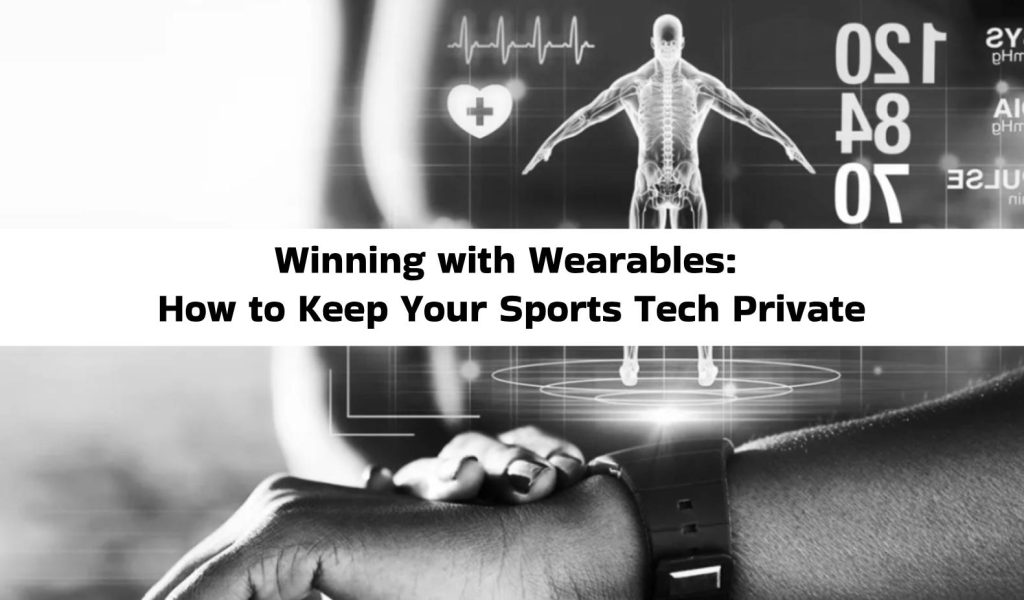Sports gadgets have changed the way athletes train, track progress, and improve performance. Whether you’re a professional or a fitness enthusiast, wearable technology helps you stay on top of your game. Smartwatches, fitness trackers, and AI-powered gear provide real-time insights into health and endurance.
But there’s a catch—privacy risks. These devices collect a lot of personal data, often without users realizing how much information they’re sharing. So, how do you enjoy the benefits of sports technology without compromising your privacy? Let’s dive into the CyberGhost (CG) research data. And learn the risks, challenges, and best ways to protect yourself.

Why Wearable Sports Tech Is Everywhere
Wearable sports gadgets are now a must-have in fitness culture. They track performance, monitor health, and even prevent injuries. Some of the most popular devices include:
- Smartwatches & Fitness Trackers – Brands like Apple, Fitbit, and Garmin help track your heart rate, steps, sleep, and location using GPS.
- Smart Shoes & Insoles – Nike and Under Armour design shoes with built-in sensors. These sensors analyze your running style and efficiency.
- Biometric Compression Gear – Some sportswear brands add sensors to clothing. It helps them to track muscle movement, fatigue, and hydration levels.
- AI-Powered Performance Trackers – Smart tennis rackets, golf clubs, and basketballs use AI to study movements. They give real-time feedback to help athletes improve.
These devices make training smarter. But they also store a lot of personal data—and that’s where the risks begin.
What Data Do These Gadgets Collect?
Most sports tech gathers and saves information such as:
✅ Location Data – GPS-enabled devices track movement, running routes, and training locations. This could expose an athlete’s home address or daily routine.
✅ Biometric Data – Devices store heart rate, sleep patterns, body temperature, and oxygen levels.
✅ Performance Stats – They record speed, endurance, calories burned, and training habits.
✅ Behavior Patterns – Many gadgets analyze workout schedules. That reveals when and how often someone exercises, rests, or travels.
This data is useful for improving fitness. But when stored or shared carelessly, it can put your privacy at risk.
The Hidden Dangers of Sports Tech
Tracking your health and progress sounds great—until you realize how easily this data can be misused. According to CG’s blog post, many sports gadgets lack proper security, leaving athletes vulnerable to cyber threats.
1. Unsecured Data Transmission
Wearables sync with apps and cloud services through Bluetooth, Wi-Fi, or mobile data. If these connections aren’t encrypted, hackers can steal real-time location data and health stats.
Imagine someone hacking into a smartwatch and tracking an athlete’s location during a run. This could lead to serious safety concerns.
2. Apps Asking for Too Many Permissions
Many fitness apps request access to:
📸 Camera 📞 Contacts 🎙️ Microphone 📍 Location services
Not all of these permissions are needed. CyberGhost (CG) research found that some fitness apps collect way more data than necessary—often to sell it to advertisers.
Most people agree to these permissions without thinking, giving companies full access to personal data.
3. Your Data Could Be Sold Without You Knowing
As revealed by CyberGhost (CG), many sports tech companies sell user data to:
💰 Advertisers – Companies use workout data to target users with fitness-related ads.
🏥 Insurance Providers – Some insurers adjust health coverage based on fitness data.
🚔 Law Enforcement – In certain cases, police have accessed fitness data for investigations—sometimes without consent.
4. Risk of Cyberstalking
For professional athletes, location-tracking wearables can be a huge risk. If someone gains access to real-time training data, they could:
🔎 Track an athlete’s daily routine and predict their schedule.
🏠 Find their home address by analyzing run start and endpoints.
⚠️ Expose training vulnerabilities, leading to safety concerns.
The research revealed that even military personnel and professional cyclists have had their locations compromised due to fitness tracking apps.
How to Keep Your Sports Gadgets Private
You don’t have to ditch wearables altogether. But you should take steps to protect your data. Here’s how:
1. Limit App Permissions
Before installing an app, check what permissions it asks for. If a fitness tracker doesn’t need access to your contacts or camera, turn those off.
2. Use Strong Passwords & 2FA
Fitness apps require sign-ins, so use strong, unique passwords. Enable two-factor authentication (2FA) for extra security.
3. Turn Off GPS When You Don’t Need It
Unless real-time location tracking is necessary, disable GPS. This stops your device from sharing unnecessary location data.
4. Opt Out of Data Sharing
Most fitness apps let you adjust privacy settings. Always review them and opt out of unnecessary third-party data sharing.
5. Keep Software Updated
Manufacturers release updates to fix security issues. Keep your wearables and apps up to date to reduce hacking risks.
6. Avoid Public Wi-Fi When Syncing Devices
Public networks are easy to hack. If you’re syncing fitness data, use a secure, encrypted connection.
What’s Next for Sports Tech & Privacy?
As wearable tech advances, privacy concerns will grow. Manufacturers are working on better security, but athletes must still take charge of their own data.
Some future solutions might include:
🔗 Blockchain technology – A safer way to store fitness data.
🔐 Decentralized data storage – So you control your data instead of big companies.
Until then, it’s important to stay alert and protect your information.
Final Thoughts
Sports wearables have changed the game. They help athletes improve, track progress, and train smarter. But as this article revealed, they also pose serious privacy risks—from data breaches to cyberstalking.
The good news? You can enjoy sports tech while staying safe.
By disabling unnecessary permissions, using strong passwords, limiting GPS tracking, and reviewing privacy settings, you can protect your personal data.
In today’s digital world, privacy is just as important as performance. Take the right precautions, and you can enjoy the benefits of sports gadgets without putting yourself at risk.